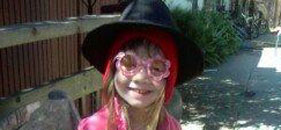
by Maria Kubitz
Dear Margareta,
On September 1, you would have turned eight years old. It will be the fourth birthday we have to celebrate without you here to celebrate it with us. The fourth time we have to sing “Happy Birthday” while holding back the tears. After this month is over, you will have been gone longer than you were alive.
It wasn’t supposed to be this way. You were supposed to live a long, full life. A life full of adventure. A life full of creativity and quirkiness. You were supposed to continue to surprise us with your choices and path in life. You were supposed to be my best friend and confidant. You were supposed to continue to challenge my status quo and widen my horizons. You were supposed to…
Whatever you were “supposed to do” was lost the day you died. My dreams for you will never come true. I am left sitting here holding my shattered dreams of raising a daughter. I kindly brush off the question, “Are you going to try for a girl?” when some stranger sees or hears I have four boys. I can’t bring myself to prolong the conversation by saying that I already have a daughter…because the pain that comes with that statement still feels like a knife was just stuck in my heart all over again.
Despite my continuing anguish over not having you by my side, you still continue to teach me each and every day. You have taught me a deeper appreciation of life than I could have ever imagined. Everything has more meaning now. The joy I have learned to feel again is that much sweeter. The love I feel is that much more profound. The respect I have for this earth and all its gifts is that much more substantial. I pause longer and savor the beauty around me more than I once did. And while the sadness and violence throughout this world can now be overwhelming and bring tears more easily, I feel more compassion than I did before because I now understand pain that transcends words to describe it.
I am no longer satisfied to just “survive” life as I once did. I am no longer able to just bury painful emotions and pretend that it will magically get better someday. I now truly understand that our lives require a lot of work, and we cannot just sit idly by and blame others and lament that they are not acting or being the way we need them to be. I have fully learned that only I am responsible for my own situation and path in life. That is not to say that I don’t still falter and fall back into old bad habits and thoughts. But now that I have seen this gift that is life so quickly taken away, I am compelled to keep moving forward whenever I stumble.
I look forward to your many signs and whispers to me every day. They not only remind me of your continuing presence and importance in my life; they keep me grounded in the moment. They keep me tuned to love. For if I have learned anything from both your life and your death, it is that love is always within us, around us, and the way through. I often hear other parents faced with the tremendous pain of losing a child ask, “How do I go on?” Many times, both I and others answer, “You just do. One day, or one moment, at a time.” But the real answer is love. Our love is what gets us through the darkest moments.
Margareta, it is through you that I’m able to fulfill a lifelong dream. Since I was a little girl, I’ve known that I want to help people. I’ve never quite known how, but here it is. I’m helping others through their grief by being honest about my own. I’m able to show others there is hope. I do this in your name and in your honor. With only four short years on this earth, you left an indelible mark on the hearts of those who knew you, but you weren’t able to make your mark on the world. Here is your mark. You are helping others make it through their darkest hours. And you’re leaving your mark through love and compassion.
Your light shines on, and it shines ever so brightly as it did while you were here with us. You truly are our sunshine, and I continue to bask in your loving light.
With all my love,
Mama
Written by Maria Kubitz for her daughter, Margareta Kubitz
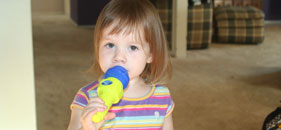
by Maria Kubitz
Ever since she was born, I sang songs to my daughter, Margareta. I had my short list of favorites, and would sing them usually to get her settled down to sleep, but over time I would sing to her throughout the day whenever the moment struck me. I even added my own lyrics to the french song “Alouette” that I had learned as a child to make a song about how much I loved her.
As soon as she could talk, Margareta loved to sing herself. She had a knack for memorizing lyrics, even at the tender ages of two and three. In the car, we would sing songs together, and the second a song was over she would ask for me to sing another one. She did this so often, I even came up with a song called “One more song, Mama”.
Margareta’s older brother, Andrew, also loves to sing. He too had started singing from a very young age. Starting in third grade, Andrew began performing in musicals – either through summer camps or at school. As a result, he would be practicing his songs at home and Margareta would do her best to learn them as well. Because she couldn’t read, this meant just listening to him sing over and over and memorizing what she heard. It led to some funny interpretations sometimes.
The songs she learned from her brother that stick out in my memory are “Iowa Stubborn” and “Gary, Indiana” from The Music Man, and later on “If I Only Had a Brain” from the Wizard of Oz. Of course, she only learned parts of the songs, but the parts she sang, she sang with purpose and gusto – as if she were going to be up on that stage herself.
The song she learned from her brother the best was “If I Only Had a Brain”. She memorized three quarters of the song and sang it over and over again. In perfect pitch, I might add. It became her favorite song. We often talked of Margareta and Andrew ending up singing in a band together. A dream that can never come true.
Andrew sang “If I Only Had a Brain” for his sister at her memorial service with tears in his eyes. It will now forever be the song that reminds me of my little girl who loved to sing.
Submitted by Maria Kubitz in loving memory of her daughter, Margareta.
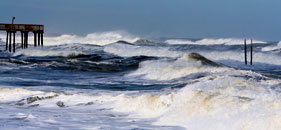
by Denise Smyth
I thought of this story because I was talking about protecting Philip, and because of how deeply we’re affected by the vulnerability we share with our kids. Because we do share it. I might be the one who’s supposed to be doing the protecting, but look at the price I pay if I can’t.
The summer when Philip was four or five and Natalie was two or three, we stayed overnight in Point Pleasant, NJ, with Janine and her son Jake. It was hot and sunny and sticky and when we got to the beach, it was closed. If there was such a thing as a triple-X red flag, it would’ve been flying. I’ve never seen a beach this way. The water was hurling itself at the shore, right up to the boardwalk. In fact, there was no shore; just a boardwalk and lots of hysterical water.
Do Not Enter or not, the beach wasn’t roped off, so we went down the boardwalk stairs just to gape. I’m a weather girl. Not as in, oh, it’s warm and sunny so we should get our asses out and do something. I mean as in ice storms, snowstorms (which my town has decided to call “snow events,” leaving me to wonder just what it is our Town Officials spend the better part of their time – and our money – doing), rainstorms, thunderstorms, storms of any kind. The more nature misbehaves, the better. Of course, all I know is the NY Metro area kind of weather, not the Storm-Chaser, Dorothy’s-house-flying-through-the-air kind. The ocean that day might not be classified as “weather,” but it was Nature being Really Exciting.
The five of us stood just under the boardwalk, Janine and I holding our kids’ hands. No one else was there because really, no sane person would’ve been. You could see what was going on from the top of the boardwalk; no need go down those stairs to get under it. But we did, and the panorama of that unobstructed wild ocean letting its white, foamy hair down and shaking it out with a vengeance was mesmerizing.
Possessed, I took Philip’s still-chubby four-(or five)-year-old hand and walked deeper into that maniacal frothing sea. I was both thrilled and terrified; for God’s sake, I wouldn’t know how to float in a bathtub, never mind do a free-stroke or a backstroke or any other stroke that was supposed to keep my head above more than about four feet of water; what the hell was I doing tempting fate?
Correction. What was I doing tempting fate with my child?
I’d say it was a modified version of that thrill-seeking thing that makes people jump out of airplanes or climb big, scary mountains. And I think that attraction, dangerous as it is, is the pull of life. It’s the need to have all your senses mobilized and attentive, so there isn’t you and the ocean or the sky or the mountain because you are the ocean and the sky and the mountain. I mean, you’re not thinking about anything except what you’re doing, and how peaceful is it not to have to listen to the damn whining voices in your head. It’s what I’d thought meditation was about, but I hadn’t the patience to get there by sitting around and trying not to think. And here was an unsought opportunity to shock myself awake.
We didn’t walk far. We couldn’t. The water rushed at us, smacking my shins and splashing up my thighs, then rushed back on itself, trying to take us with it. It was gorgeously, savagely, beautiful; it was The Call of the Wild that I wanted to answer, but I didn’t know how.
So I turned to go back to the boardwalk, and a few steps later I realized I’d let go of Philip’s hand. I had stood there marveling at the ferocity and velocity of that ocean and then I dropped my son’s hand. I don’t remember doing it, I just remember spinning around in shock and dread, to see that Philip had been knocked down to his hands and knees, and some woman was helping him to get up.
What followed was some eerie dream-like sequence where I moved toward her and she gave Philip’s hand to me and I took it, unable to see what I’m sure were her accusing eyes behind her sunglasses, unable to say anything because the enormity of what I’d done was already taking hold, because the roaring of the ocean wouldn’t have allowed me to be heard anyway. Then somehow I was back at the boardwalk, back to Janine, who hadn’t seen any of it. I didn’t tell her. If I had, I would have had to say, “I think I almost let my child die.” That he didn’t die didn’t change my carelessness. It wasn’t because of me that he didn’t die. It was because of that woman, whoever she was, wherever she came from. As far as I was concerned, she saved his life.
For years, right up until Philip died, I’d get slightly sick and slightly dizzy when I thought about that day. For just a second my stomach would lurch. I told Philip about it once, but he just shrugged it off. What did it matter to him? He didn’t even remember it.
But after Philip died, the truth of that day hit me, and it knocked me over like one of those big old waves did to him. My son wasn’t saved that day; I was. Because if he would have died then, I don’t know what shell of a person I would have become and what Natalie would have had to suffer because of it. Look; Philip was a young man on his own, and I couldn’t protect him from the choices he made, or the body he was given. But he is my son. He was vulnerable and I was helpless. That I can work through; and to a degree, I have. But if I’d lost him then? If he had died because of my carelessness when I was supposed to be taking care of him?
My heart is on its knees in gratitude. I was graced that day, and I understand the difference between the way it happened and what it would have been like if it had happened then. It’s a nightmarish way to get perspective. But if my son had to die, better it be with my conscience clear.
Submitted by Denise Smyth in loving memory of her son, Philip.
You can find out more about Denise Smyth and her son Philip on her blog, forphilip.com.
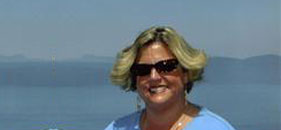
by Maria Kubitz
I met Sue when I interviewed her as a potential daycare provider for my son. She was a larger than life personality, but at the same time, gentle and loving. She had a special way with children that was clear from that very first interaction with my son. I recall her telling me years later that she actually preferred interacting with children to adults because children were authentic and honest beings. They say what they feel and live in the moment – which is exactly what Sue was like.
It took me a while to get really close to her. Having been a shy, quiet person all my life, I gravitated towards these loud, outspoken, energetic people, but I often just lived in their shadow. One morning when I was dropping my son off at her daycare during an extremely difficult situation in my life, Sue simply asked me, “Are you OK?” It was if the flood gates crashed open. I poured my heart out to her, letting her see every ounce of vulnerability in me. Sue did exactly what I needed most: listened intently, didn’t judge, didn’t offer advice. She was just a loving, safe shoulder for me to cry on. From that moment, my most important friendship was born.
Sue and I were different in a lot of ways, but emotionally, we were very similar. We both trusted each other enough that we could be 100% honest and say anything without fear of judgement. It was my first real understanding of what unconditional love felt like with someone other than my children. For that, I am truly grateful.
Often, I would take extended lunches from work and go sit with Sue in her living room while the children in her daycare napped, and we would just talk and enjoy each others company. We would act as sounding boards to whatever was going on in our lives. No topic was off limits, and even if we disagreed about something, we both knew that either of us would support the other no matter what.
Unfortunately, some years later I was laid off from my job. After that I lived and worked too far away to see her very often. But the distance did not lessen the importance of her friendship. I still considered her my best friend.
When my daughter died, Sue was the second person I called. She dropped everything and she and her husband came to stay in a hotel in our town for a number of days. I hadn’t asked her to do this, she just did. She was with me every step of the way in those horrible first few days. She took charge of making those impossible arrangements: mortuary, cemetery, location for the memorial, etc. She made sure I ate when I had no appetite. She took my hand and led me to my room when she saw I needed to collapse and get away from everyone. She even insisted to the staff at the mortuary that she be the one to comb my daughter’s hair and get her dressed for the viewing and memorial service so that it was done by someone who loved her. To this day, words could never adequately express my appreciation and love for Sue.
After battling heart issues for years, Sue passed away in her sleep at home several days before the first anniversary of my daughter’s death. It hit me like a ton of bricks. She was too young to die. Too full of life. I didn’t want to believe it. But as I’ve learned all too well, life is precious, unpredictable, and whether we like it or not, comes to an end at some point.
The morning after I heard that Sue died, I saw the most amazing sunrise. Tears rolled down my cheeks as I smiled, remembering what a wonderful friend she was and how I had become a better person through knowing her. My friendship with Sue will remain one of the most important relationships of my life. I miss her with all my heart.
Submitted by Maria Kubitz in loving memory of her friend, Susan Coronado.
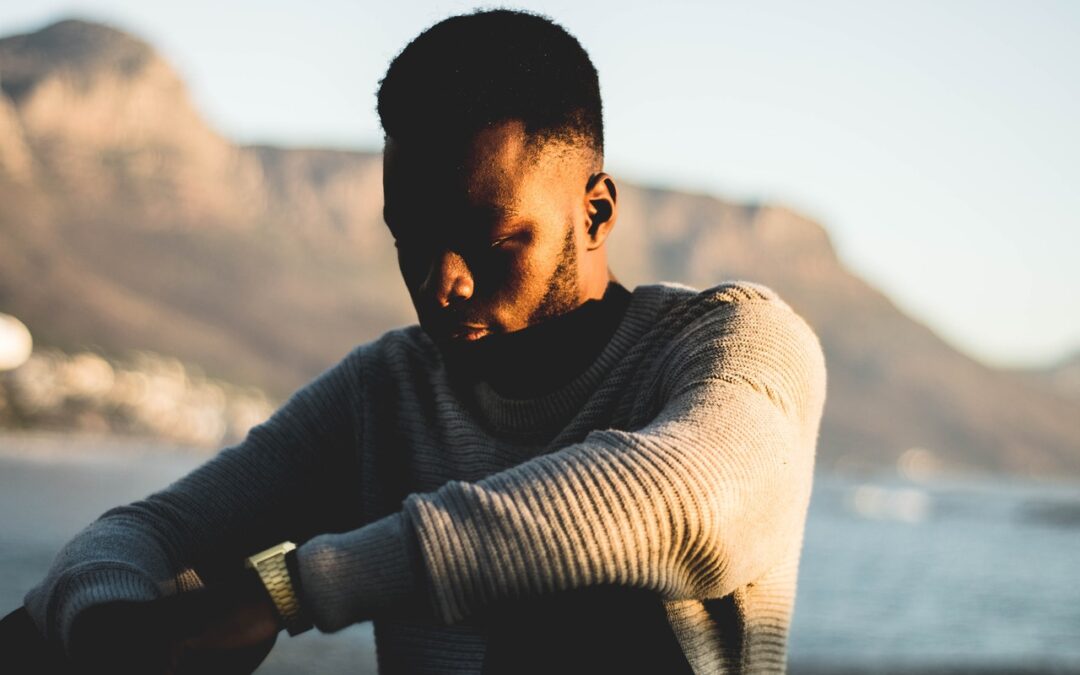
by Maria Kubitz
We live in a world where – if you have the means – pain and suffering are to be avoided at all costs. People are always looking for the next “quick fix” to alleviate discomfort. Preferably with the least amount of effort required. In many cases, this means treating the symptoms while ignoring the root cause of the problem.
Our society is so uncomfortable with emotional pain that when someone dies, the outward mourning period is expected to end once the funeral is over.
When the bereaved do not cooperate with these prescribed time tables, they are often accused of “wallowing” in their grief. They are indignantly told to “move on” and “get over it.”
But is prolonged outward grief is a sign of weakness? Or maybe self-pity? Do they think the bereaved secretly enjoy the pain and the attention it brings? For those of us who have lost someone dear to us, we know none of this could not be further from the truth. If we could, we would give ANYTHING to not feel this pain.
The problem is our outward projection of sadness is an unwelcome reminder.
It represents all the negative emotions they’ve managed to stuff deep inside until the pain is suppressed.
So which is healthier? Suppressing grief, only to have it lie dormant until some tragedy unearths it again – but this time stronger and more painful? Or to acknowledge there is no quick fix to alleviate the overwhelming pain of losing someone you have built your life – and in some cases, your identity – around?
Suppressing grief is like following the latest fad diet.
Everyone wants to lose weight quickly without exercising or changing eating habits. Maybe you’ll pop some appetite suppressing pills and lose weight in the short term. But the chances of you keeping the weight off are slim. The reality is that the next time you try to lose weight, it will likely be harder than the time before.
The alternative means facing the harsh reality that transforming your body to a stable, healthy weight is challenging. It requires permanently changing your eating habits and amount of regular exercise. You likely need to readjust your expectations of what your ideal body should look like. Sadly, most of us will never look like supermodels or pro athletes. In other words, the second option is HARD WORK, but it has the greatest likelihood of becoming a permanent reality.
But if I’m being honest here, I have to admit that given the opportunity, I would have gladly chosen to bury the overwhelming pain when my daughter died. Suppressing pain and emotions is what I had done my whole life until that point.
The fact is the pain of losing someone I loved MORE than my own life was too much to bury.
I reluctantly – and resentfully – took on more pain than I could bear. I did so because I had no other choice.
For the first time in my life, I learned how to slowly take small steps with that unbearable load on my back. In support groups and counseling, I learned sharing my story and my pain reduced the load. Even if it was only a very slight amount each time.
By reducing the load over months and then years, it became easier to carry. I have since come to understand that the load will never fully go away, but I have learned how to balance it with the rest of my life. And as time goes on, the balance will become easier still.
That is not to say that occasionally, the load won’t suddenly feel nearly as heavy as it did when my grief was new. And when it does, I’ll remember how to go back to taking small, careful steps until it feels lighter again.
To all those who cringe in discomfort when they see me experiencing outward emotional pain, I say this: just let me be sad.
My intention is not to make you feel uncomfortable. I don’t expect – or want – you to follow in my footsteps. But I do expect you to respect the path I have been forced to take on my journey through life. I truly hope you never have to carry this load yourself.






 This website was inspired by the memory of Margareta Sol Kubitz in hopes of helping others work through the pain of grief.
This website was inspired by the memory of Margareta Sol Kubitz in hopes of helping others work through the pain of grief.